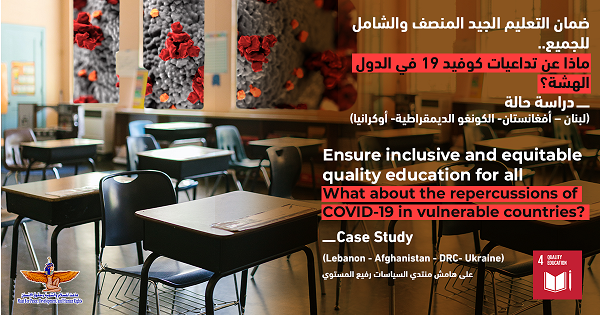اخبار
ماعت تحذر من تراجع أوضاع التعليم في الدول الهشة: الهدف 4 للتنمية المستدامة في خطر
"عقيل": نطالب الجهات المانحة الدولية المعنية بدعم برامج التعليم بتكثيف برامجها في الدول الهشة

محمود بارومه
“مريم صلاح”: نوصي المنظمات الدولية بالضغط على “طالبان” للتراجع عن قرارها بمنع الفتيات من التعليم
حذرت مؤسسة ماعت للسلام والتنمية وحقوق الإنسان من استمرار تأثير أوضاع الدول الهشة والمتأثرة بالنزاعات وما بها من عدم استقرار على قطاع التعليم بشكل سلبي وتراجع مؤشرات تحقيق الهدف 4 من أهداف التنمية المستدامة. جاء ذلك في دراسة أطلقتها ماعت على هامش مشاركتها في منتدى السياسات رفيع المستوي لعام 2022، تحت عنوان ” ضمان التعليم الجيد المنصف والشامل للجميع.. ماذا عن تداعيات كوفيد 19 في دول الهشة”.
تناولت الدراسة تأثير كوفيد-19 على مدى تحقيق الهدف الرابع المتعلق بالتعليم الجيد في الدول الهشة، حيث يتأثر قطاع التعليم بشكل كبير من الأوضاع المتوترة في الدول الهشة سلبيًا، وما يزيد الوضع سوءً هو انتشار فيروس كورونا، بالتركيز على أربع دول كدراسات حالة ممن يعانون الأزمات السياسية والأمنية وهم الكونغو الديمقراطية وأفغانستان ولبنان وأوكرانيا، حيث تم التركيز على أكثر الدول اشتعالًا في الوقت الحالي في كل إقليم من الأقاليم الآتية؛ أفريقيا وأسيا وأوروبا والمنطقة العربية، حيث أن لكل دولة منهم أسباب مختلقة لنشوب الحروب بها، وتشترك فيما بينها في تراجع مؤشرات تحقيق الهدف 4 من أهداف التنمية المستدامة.
ومن خلال الرصد والمتابعة، أكدت الدراسة أنه نتيجة غلق حكومة الكونغو الديمقراطية للمدارس في 2020 بسبب جائحة كوفيد 19، عطلت تعليم 27 مليون طفل بينهم 12.9 مليون فتاة، وتشير التقديرات إلى أن حوالي 6 ملايين طفل ومراهق كانوا خارج المدرسة قبل انتشار الوباء. وقدرت الدراسة أن 3.7 مليون طفل في أفغانستان خارج المدرسة، 60٪ منهم من الفتيات مؤكدة أن أفغانستان دائمًا بؤرة لعدم المساواة بين الجنسين خاصة التعليم.
وخلال الأزمة الأوكرانية الأخيرة تضرر قطاع التعليم بشكل وخيم، حيث هددت الهجمات على المدارس في أوكرانيا حياة ومستقبل 7.5 مليون طفل، وقتل ما يصل إلى 10 أطفال في القتال، وقصف المنشآت التعليمية في أنحاء البلاد. كما أدى الصراع في شرق أوكرانيا إلى تدمير أكثر من 750 مدرسة. وفي لبنان أكدت الدراسة أن 74% من السكان يعانون الفقر، وبلا شكّ أوّل حلّ يطرح هو التوجه الى التعليم الرسمي، ولكن سياسات إهمال قطاع التربية على مدى سنوات وغياب الرقابة على المدارس الرسمية خاصة في البلدات النائية، وضعت التعليم الرسميّ في مراتب متأخرّة، بل خارج المنافسة .
وفي هذا السياق أشار الخبير الحقوقي أيمن عقيل، أن الأطفال في مناطق النزاع والدول الهشة يعيشون في غمرة المعركة التي يخوضها العالم، وهم الفئات الأكثر عرضة للخطر جرّاء الآثار الوخيمة المترتبة علي جائحة كوفيد-19، مؤكدا على ضرورة دعم تعليم الأطفال في تلك المناطق، وهو الأمر الذي يجب أن تعمل عليه المؤسسات المعنية بتحسين وضع التعليم في مناطق النزاع والدول الهشة.
وقد طالب عقيل الجهات المانحة الدولية المعنية بدعم برامج واستراتيجيات التعليم، بتكثيف برامجها الخاصة بالتعليم في مناطق النزاع والدول الهشة، وتشجيع تلك الحكومات على إصدار برامج وطنية لإصلاح قطاع التعليم بما يتماشى مع تحقيق الهدف 4. وتأكيد حرص كافة الحكومات على الالتزام بالاتفاقيات الدولية لحماية الأطفال بجانب البروتوكولات المُكملة له.
ومن جانبها، أوصت مريم صلاح؛ الباحثة في وحدة التنمية المستدامة بمؤسسة ماعت، المنظمات الدولية المعنية بحقوق المرأة في التعليم بالضغط على حركة طالبان للتراجع عن القرار الصادر بشأن منع الفتيات من تلقي التعليم العالي حيث أن النساء يواجهون صعوبة شديدة في تلقى تعلمهم، كما أوصت المجتمع المدني وأصحاب المصلحة العاملين في مجال التنمية المستدامة بتوحيد جهودهم من أجل إيجاد اقتراحات وحلول لتحسين وضع تحقيق الهدف 4 من أهداف التنمية المستدامة في الدول الهشة، وإيلاء مزيد من الاهتمام لفئات المهمشة.
الجدير بالذكر أن ماعت تشارك في فاعليات المنتدى السياسي رفيع المستوى في الأمم المتحدة المنعقد في شهر يوليو الجاري بمدينة نيويورك بالأمم المتحدة، تحت شعار “إعادة البناء بشكل أفضل من فيروس كوفيد 19 مع تعزيز التنفيذ الكامل لخطة التنمية المستدامة لعام 2030”. وذلك باعتبارها منسق شمال أفريقيا في مجموعة المنظمات غير الحكومية الكبرى في أفريقيا.
للاطلاع علي الدراسة، يرجي زيارة الرابط التالي: https://www.maatpeace.org/ar/?p=35855
Maat Warns against the Deteriorating Education Levels in the Fragile States: SDG 4 is in Danger
Okeil: We call on international donors concerned with supporting education programs to intensify their programs in fragile countries
Mariam Salah: We recommend international organizations to pressure the Taliban to reconsider its decision on denying girls access to education
Maat for Peace, Development and Human Rights has warned of the negative impact of fragile and conflict-affected countries on the education sector and the decline in indicators for achieving SDG 4. This came in a study issued by Maat on the sidelines of its participation in the High-level Political Forum (HLPF) 2022, entitled “Ensuring Equitable, Inclusive and Quality Education for All… What about the Repercussions of Covid-19 in Fragile Countries?”
The study discussed the impact of Covid-19 on the achievement of SDG 4, which has to do with quality education in fragile states. The education sector is negatively affected by the tense conditions in these fragile countries and the situation is even exacerbated by the spread of Covid-19. The study focuses on four countries as case studies for those who suffer from political and security crises, which are the Democratic Republic of the Congo, Afghanistan, Lebanon, and Ukraine. The study focused on the most troubled countries at the present time in each of the following regions; Africa, Asia, Europe, and the Arab region, with each having different reasons for the outbreak of wars, and they all experience a decline in indicators for achieving SDG 4.
Through monitoring and follow-up, the study confirmed that the DRC’s closure of schools in 2020 due to the Covid-19 pandemic has disrupted the education of 27 million children, including 12.9 million girls. It is estimated that about 6 million children and adolescents were out of school before the spread of the pandemic. The study estimated that 3.7 million children in Afghanistan are out of school, 60% of whom are girls, stressing that Afghanistan has always been a hotbed of gender inequality, especially in education.
During the recent crisis in Ukraine, the education sector was severely affected. Targeting schools has threatened the lives and futures of 7.5 million children, and up to 10 children were killed in the fighting. Educational facilities were bombed across the country. The conflict in eastern Ukraine has also destroyed more than 750 schools. In Lebanon, the study confirmed that 74% of the population suffers from poverty. The first solution presented is to direct efforts to develop formal education, but the years of negligence and the absence of oversight over public schools, especially in remote areas, placed formal education in an unfavorable condition.
In this context, Ayman Okeil, the human rights expert and president of Maat, indicated that children in conflict areas and fragile states live amidst ongoing wars and they are the most vulnerable to the severe effects of the Covid-19 pandemic, which stresses the need to support children’s education in those areas. This role is entitled to institutions concerned with improving the situation of education in conflict areas and fragile states.
Okeil called on international donors concerned with supporting education programs and strategies to intensify their education programs in conflict areas and fragile states, and to encourage those governments to issue national programs to reform the education sector in line with the achievement of SDG 4, emphasizing the keenness of all governments to abide by international agreements to protect children, as well as additional protocols.
For her part, Mariam Salah, a researcher in the Sustainable Development Unit at Maat, recommended that the international organizations concerned with women’s rights in education must pressure the Taliban to reconsider the decision to prevent girls from receiving higher education. Salah also recommended civil society and stakeholders working in the field of sustainable development to unite their efforts and find solutions to improve the status of achieving SDG 4 in fragile states, and to pay more attention to marginalized groups.
It is worth noting that Maat is participating in the activities of the UN High-Level Political Forum, held this July in New York City at the United Nations, under the theme “Building back better from the COVID-19 virus while promoting the full implementation of the 2030 Agenda for Sustainable Development”, in its capacity as the regional coordinator for the North Africa region in the NGOs Major Group for Africa.
To read the full study, please follow this link: https://www.maatpeace.org/en/?p=35855
Regards
Media Unit Coordinator
Headquarters: 148 Masr Helwan El Zyraei Rd,El Matbaa Sq, Hadayeq El Maadi, 4th Floor, No 41, Cairo, Egypt
Maat Training Center : 380 Corniche El Nil St., Gawharet El Maadi Tower,38th Floor, Tower B, Cairo, Egypt
P.O.Box: 490 El Maadi | Telefax. : 00 (20) (2) 25344706/7 | Mobile: 00 (2) (0) 1277392939
Email: maat@maatpeace.org | info@maatpeace.org Website: www.maatpeace.org
Organization in special consultative status with the Economic and Social Council since 2016




